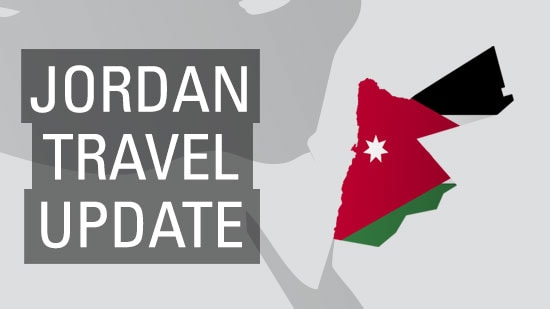Jordan looks to reopen airports at the end of July
It has been reported by media outlets that Jordan plans to reopen its airports to tourists from a limited number of countries at the end of July. The change of policy was announced in a broadcast by the Prime Minister, Omar Razzaz, who stated that Jordan had been declared safe for tourists by the World Travel and Tourism Council in light of its actions to manage the Coronavirus pandemic.
Amenities such as hotels, restaurants, museums and diving centres were given guidance in June on how they should prepare for the restarting of tourism in Jordan.
Jordan acted swiftly to mitigate the spread of Coronavirus by quarantining hundreds of citizens straight from their aircraft upon landing. Passengers were transferred directly to hotels in Amman and the Dead Sea region and kept under quarantine for two weeks as part of the government’s strict lockdown.
A "green list" of 10 countries, which could be given permission for their travellers to enter Jordan, has been prepared by the Jordan Tourism Board, as announced by Abdul Razzaq Arabiyat on the 24th of June. Countries hoping to be on the list would need to have a similar or better coronavirus infection curve to Jordan and conduct at least 30,000 COVID-19 tests per million citizens.
In a televised address to the nation, the Prime Minister appealed for vigilance as 14 new cases of Coronavirus were reported on Sunday.
"With all of you and the leadership of His Majesty King Abdullah II, we were able to reach what we have achieved, and the battle has not ended, and the opportunities lie ahead," he said. "We will overcome all the hardships that we will face, as we have overcome the adversities in the past and emerged from them a strong state stronger than we were."
Minister of Health of Jordan, Saad Jaber, said that three lorry drivers entering the kingdom through land borders, one Jordanian and two non-nationals, were included in the new cases. The remainder of the cases are already quarantined following their returns from the UAE, Saudi Arabia and Egypt.
Other areas of the Middle East have been struggling to tackle the spread of the Coronavirus.
Qatar, which had seen its daily case numbers fall from a peak in late May, has seen a recent spike in new infections and subsequent deaths. Only about 12% of Qatar's 2.8 million population are Qatari nationals and COVID-19 has spread among migrant workers on low incomes living in crowded accommodation. However, Qatar began lifting restrictions on the 15th of June and will allow the limited reopening of restaurants, beaches and parks from the 1st of July.
Within the Gulf Cooperation Council, Saudi Arabia has the highest number of cases with Qatar having the second-highest. Together, they have recorded more than 489,000 cases and 3,000 deaths.
Kuwait is also reporting new cases of the virus but plans a limited restart of commercial flights from the 1st of August. A partial curfew remains in place.
Click here to find out more information on global travel restrictions.

 It has been reported by media outlets that Jordan plans to reopen its airports to tourists from a limited number of countries at the end of July. The change of policy was announced in a broadcast by the Prime Minister, Omar Razzaz, who stated that Jordan had been declared safe for tourists by the World Travel and Tourism Council in light of its actions to manage the Coronavirus pandemic.
It has been reported by media outlets that Jordan plans to reopen its airports to tourists from a limited number of countries at the end of July. The change of policy was announced in a broadcast by the Prime Minister, Omar Razzaz, who stated that Jordan had been declared safe for tourists by the World Travel and Tourism Council in light of its actions to manage the Coronavirus pandemic.

